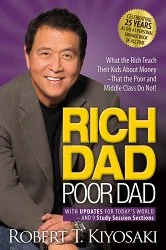Robert Kiysoaki—1997
Chapter 1: Rich Dad, Poor Dad
- One dad had a habit of saying, “I can’t afford it.” The other dad forbade those words to be used. He insisted I say, “How can I afford it?” One is a statement, and the other is a question.
- One dad recommended, “Study hard so you can find a good company to work for.” The other recommended, “Study hard so you can find a good company to buy.”
- One dad said, “The reason I’m not rich is because I have you kids.” The other said, “The reason I must be rich is because I have you kids.”
Chapter 2 lesson one: the rich don’t work for money.
- If you think I’m the problem, then you have to change me. If you realize that you’re the problem, then you can change yourself, learn something and grow wiser. Most people want everyone else in the world to change but themselves. Let me tell you, it’s easier to change yourself than everyone else.”
- The poor and the middle-class work for money. The rich have money to work for them.
- “Good,” rich dad said softly. “Most people have a price. And they have a price because of human emotions named fear and greed. First, the fear of being without money motivates us to work hard, and then once we get that paycheck, greed or desire starts us thinking about all the | wonderful things money can buy. The pattern is then set.”
- The pattern of get up, go to work, pay bills, get up, go to work, and pay bills… Their lives are then run forever by two emotions, fear and greed. Offer them more money, and they continue the cycle by also increasing their spending. This is what I call the rat race.
- Most people live their lives chasing paychecks, pay raises and job security because of the emotions of desire and fear, not really questioning where those emotion-driven thoughts are leading them. It’s just like the picture of a donkey, dragging a cart, with its owner dangling a carrot just in front of the donkey’s nose. The donkey’s owner may be going where he wants to go, but the donkey is chasing an illusion.
Lesson two: why teach financial literacy?
- If you are going to build the Empire State Building, the first thing you need to do is dig a deep hole and pour a strong foundation. If you are going to build a home in the suburbs, all you need to do is pour a 6-inch slab of concrete. Most people, in their drive to get rich, are trying to build an Empire State Building on a 6-inch slab.
- Rich people acquire assets. The poor and middle class acquire liabilities, but they think they are assets.
Lesson three: mind your own business.
- I cringe every time I hear someone say to me that their net worth is a million dollars or $100,000 dollars or whatever. One of the main reasons net worth is not accurate is simply because the moment you begin selling your assets, you are taxed for any gains.
Lesson four: the history of taxes and the power of corporations.
Lesson five: the rich invent money.
Lesson six: work to learn – don’t work for money.
- They are one skill away from great wealth. What this phrase means is that most people need only to learn and master one more skill and their income would jump exponentially.
- When I ask the classes I teach, “How many of you can cook a better hamburger than McDonald’s?” almost all the students raise their hands. I then ask, “So if most of you can cook a better hamburger, how come McDonald’s makes more money than you?” The answer is obvious: McDonald’s is excellent at business systems. The reason so many talented people are poor is because they focus on building a better hamburger and know little to nothing about business systems.
- Rich dad advised that Mike and I “groom” ourselves. Many corporations do the same thing. They find a young bright student out of business school and begin “grooming” that person to someday take over the company. So these bright young employees do not specialize in one department; they are moved from department to department to learn all the aspects of business systems. The rich often “groom” their children or the children of others. By doing so, their children gain an overall knowledge of the operations of the business and how the various departments interrelate.
- The main management skills needed for success are:
- The management of cash flow.
- The management of systems (including yourself and time with family).
- The management of people.
- The most important specialized skills are sales and understanding of marketing.
- Rich dad encouraged Mike and me to know a little about a lot. He encouraged us to work with people smarter than we were and to bring smart people together to work as a team. Today it would be called a synergy of professional specialties.
Chapter 8: overcoming obstacles.
Chapter 9: getting started.
- Financially, with every dollar we get in our hands, we hold the power to choose our future to be rich, poor or middle class.
- So what do I do? I go to seminars. I like it when they are at least two days long because I like to immerse myself in the subject.
- The three most important management skills necessary to start your own business are:
- Management of cash flow.
- Management of people.
- Management of personal time.
Chapter 10: still want more? Here are some to do’s.
- Small thinkers don’t get the big breaks. If you want to get richer, think bigger first.
- Action always beats inaction
